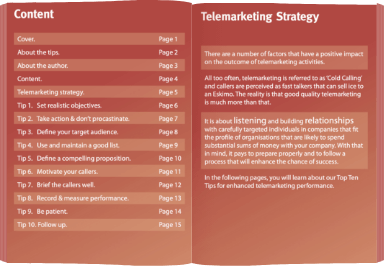An old comedian from the seventies, Frank Carson, used to say ‘it’s the way I tell ’em’
In many ways, that’s true for effective telemarketing scripts. That’s not to say that effective telemarketing language and what you say isn’t important (and we will talk about that in this blog) but it isn’t just about bombarding prospects with your sales pitch however good you think your product or service is.
the decision-maker but you also need to make sure that you have excellent gatekeeper techniques to get through in the first place.
Included in our telemarketing tips below is a key telemarketing success factor i.e. tone. We will start with that one.
-
-
- Using Great Tone in cold calls: It doesn’t matter what you say if you say it without conviction or passion. A study found that human behaviour was only influenced by words to the tune of 7% whilst tone accounted for 38%. Therefore, a fundamental factor in your successful telemarketing script is the way it is delivered to the prospect.
- Plan effective telemarketing calls: Again, we have to recognise that lack of pre-call planning can derail any call. If you haven’t understood the impact of forthcoming changes in the marketplace and your prospect asks you how the service takes account of new legislation, the whole call could be wasted and the opportunity to redeem the situation may never arise. You need to do your homework on your products and services and how they benefit prospective clients and how they fit into context in their market.
- Develop a great cold calling intro: You never get a second opportunity to create a good first impression and that’s all the more so on the phone. Your first few words (and how they are said) are crucial. You should sound natural (conversational), professional, clear, engaging and passionate about what you’re selling WITHOUT being over salesy and pushy. Hence, good telemarketing call structures begin with an attention grabbing statement that doesn’t allow the prospect to say ‘sorry, not interested’. That could be prefaced by something like ‘I wonder if you can help me’ or ‘I don’t lknow if this is relevant but…’ For example, how about something like ‘Bob, I don’t know if this is relevant for you but we’re doing a lot of stuff with people like BT and Tesco helping them to deal with the new HR legislation. Their HR director is concerned about XYZ. Out of interest, how are you handling things?’
- Plan and ask good questions: Once the initial few awkward seconds have elapsed, and you’ve hopefully engaged in some sort of discussion however loose, good open questions ensure that the conversation becomes a dialogue not a monologue. Plan the questions you want to ask around pain or gain i.e. what challenges they have or opportunities your services can give them. You should prepare a set of strong telesales questions and document these so you can use them as a pick an mix during the call. But take care not to make it sound like a research survey. The prospect will switch off fast if they feel under pressure to answer a long list of questions when you haven’t developed the relationship. Devise relevant open (and closed filter questions) and ask them gently during the flow of the call. The effective call flow is essential and good questions will enhance rapport and ultimately likely call success. Asking good questions also provides the ammunition for closing the sale (on the phone or face to face) or generating the meeting as a call outcome.
- Objection handling techniques: We have recently written a separate blog on this subject. It is a big topic and we can’t do I justice here. However, it is inevitable that buyer objections will arise and you need to deal with them. Questions are again key to qualify and clarify objections. If you do this, some will simply dissipate. If you’ve identified a valid objection, you then need objection handling skills to manage the situation. People skills are important but also you would benefit from using techniques that will subsequently allow you to move the conversation on to a conclusion. Good telemarketers know likely objections before the call and they have planned responses. Document the most common objections and your response. That way, you won’t be caught out and you will be more confident of success.
- Know your telemarketing objective and ask for it: Be clear on what our objective for calling is and close throughout the call. After the intro, if you want a meeting with them, ask for it but don’t over push. If they raise an objection, use the solutions above but suggest it’d be better to go through that face to face or with one of your more technical people. Use objections as a means to book the appointment. Telemarketers don’t have to know the ins and outs of the product or service to the detriment of booking a face to face meeting. Sometimes, a prospect will feel they have all the info they need if you provide too much detail. We like the stance where you might say ‘that’s a good question Bob. I am probably not the best person to talk to about that. Why don’t we get a date in the diary when my colleage John can go through that with you in more detail….’
-
The above tips for generating an excellent telemarketing script or structure are essential if you want to increase telemarketing success. The factors above aren’t the only things you need to consider and we haven’t dealt here with the use of compelling language and tone mirroring, different buyer communication styles and features and benefits amongst others. All of these are important if you want to improve telemarketing effectiveness. Telemarketing training can support you if you haven’t considered these aspects before in your calling. But a good start point is to work on the points above to enable you to build an effective and compelling telemarketing call structure that will help you to generate more telemarketing appointments and more sales from outbound cold calls.
If you’d like to know more or book a new business development strategy workshop and find out how GSA Business Development can help Generate Growth for your Business, by contacting us now on 0845 658 8192 or send us an email.






